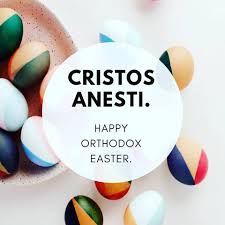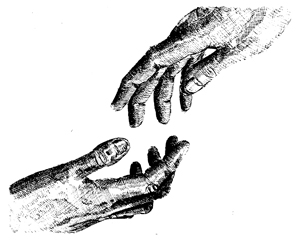
Bloor Lansdowne Christian Fellowship – BLCF Church Message for Sunday:
‘The Lessons of the Good Samaritan’
© August 19, 2018, by Steve Mickelson
BLCF Bulletin August 26, 2018
Originally Published on May 2, 2010, and later on June 8, 2014
BLCF: Bulletin June 8, 2014
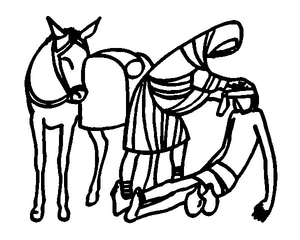
Announcements and Call to Worship; Prayer
Opening Hymn #25: Joyful, Joyful We Adore Thee; Choruses
Responsive Reading #653 (Love and Discipleship – John 13 and 1 John 1 and 3)
Message by Steve Mickelson: ‘The Lessons of the Good Samaritan‘
Let us pray…
Today’s message is entitled ‘The Lessons of Good Samaritan’, also know as The Good Samaritan, referring to one of the parables Jesus used to teach and give insight to God’s will in our lives. The word “parable” comes from the Greek “παραβολή” (parabolē), the name given by Greekrhetoricians to any fictive illustration in the form of a brief narrative. Later it came to mean a fictitiousnarrative, generally referring to something that might naturally occur, by which spiritual and moral matters might be conveyed. A parable is a short tale that illustrates universal truth, one of the simplest of narratives. It sketches a setting, describes an action, and shows the results. It often involves a character facing a moraldilemma, or making a questionable decision and then suffering the consequences. The dilemmas presented in Jesus’ parables often mirrored the real-life situations faced by those whom the parable is presented. As God has provided us with the Bible as a lamp to guide us through life, the Parable of the Good Samaritan was written for all who read His word.
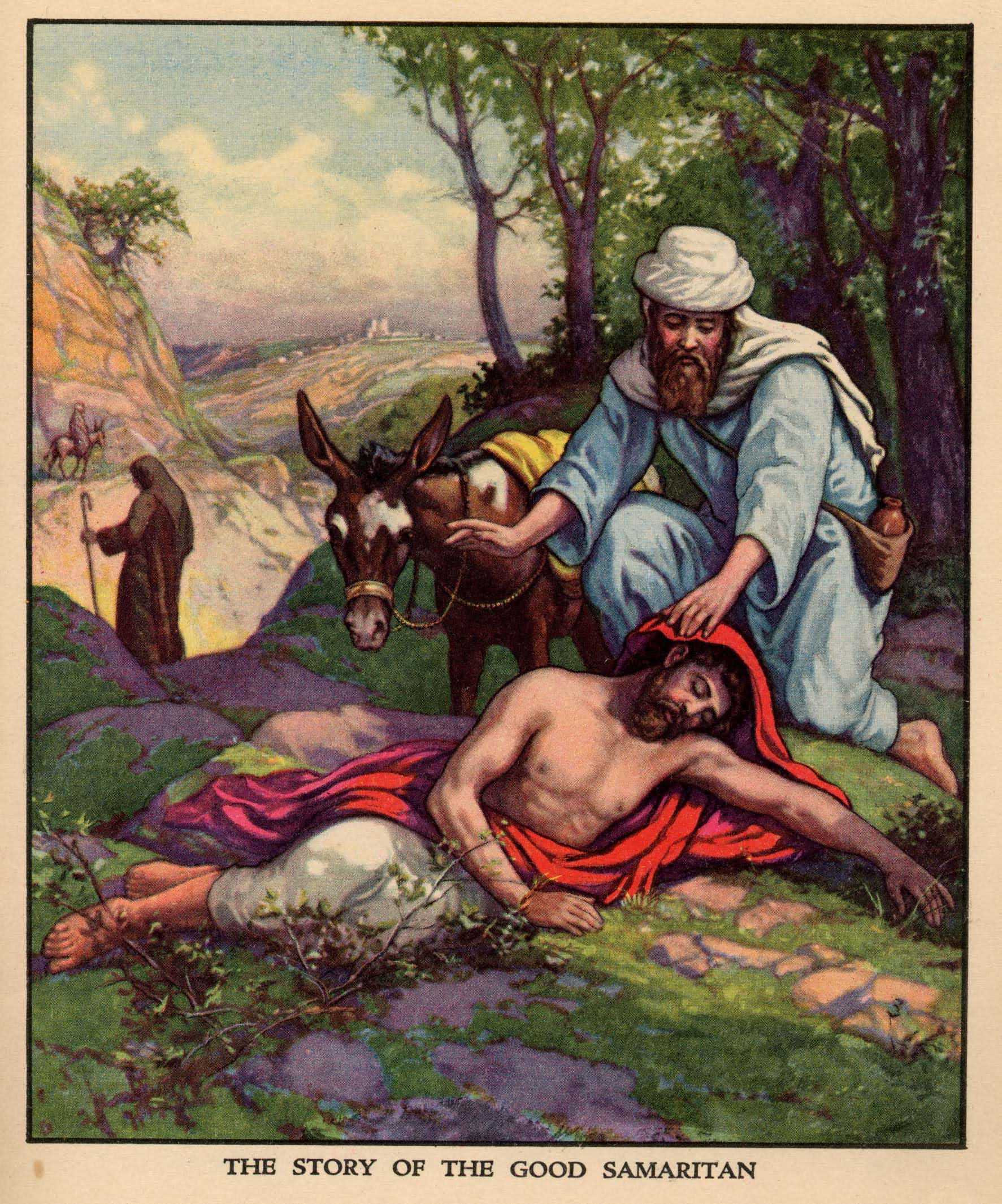
Luke 10:25-37 (ESV) The Parable of the Good Samaritan
25 And behold, a lawyer stood up to put him to the test, saying, “Teacher, what shall I do to inherit eternal life?” 26 He said to him, “What is written in the Law? How do you read it?” 27 And he answered, “You shall love the Lord your God with all your heart and with all your soul and with all your strength and with all your mind, and your neighbor as yourself.” 28 And he said to him, “You have answered correctly; do this, and you will live.”
29 But he, desiring to justify himself, said to Jesus, “And who is my neighbor?” 30 Jesus replied, “A man was going down from Jerusalem to Jericho, and he fell among robbers, who stripped him and beat him and departed, leaving him half dead. 31 Now by chance a priest was going down that road, and when he saw him he passed by on the other side. 32 So likewise a Levite, when he came to the place and saw him, passed by on the other side. 33 But a Samaritan, as he journeyed, came to where he was, and when he saw him, he had compassion. 34 He went to him and bound up his wounds, pouring on oil and wine. Then he set him on his own animal and brought him to an inn and took care of him. 35 And the next day he took out two denarii[a] and gave them to the innkeeper, saying, ‘Take care of him, and whatever more you spend, I will repay you when I come back.’ 36 Which of these three, do you think, proved to be a neighbor to the man who fell among the robbers?” 37 He said, “The one who showed him mercy.” And Jesus said to him, “You go, and do likewise.”
Therefore, we may consider the Good Samaritan Parable was written expressly for both you and me. Any lessons learned from the parable are lessons given by God to us, for our benefit, and are just as relevant today, as they were in the time of Christ.

The following story published April 26, 2010, by the Calgary Herald as reported by Tom Leonard, in New York’s The Daily Telegraph on April 26, 2010:
More than 20 people ignored a dying man for nearly two hours as he lay on a New York street after saving a woman from being mugged.
CCTV footage showed Hugo Tale-Yax, a homeless man, collapsing with stab wounds on a pavement shortly after stopping the mugger, who was armed with a knife. He lay dying in a pool of blood as people strolled past, some pausing briefly to look at him.
One even emerged from a nearby building to photograph Mr. Tale-Yax, a 31-year-old Guatemalan immigrant, with his mobile phone. Another man bent down to shake him, lifting him to reveal the pool of blood, but he still walked away.
When police and firemen finally arrived at 7:23 AM on Sunday in the Jamaica neighbourhood of Queens to find Mr. Tale-Yax was dead, he had been lying there for an hour and 40 minutes.
The same video footage earlier showed an unidentified woman being accosted by a man, who was then involved with a scuffle with Mr. Tale-Yax. As the other two fled in opposite directions, Mr. Tale-Yax staggered a few yards before collapsing.
He was found by firemen responding to an emergency call. Police said they received three calls, one about a screaming woman and another about a man lying in the street. But both calls apparently gave the wrong address and officers found the right location only after a third call.

The incident has reminded New Yorkers of the notorious killing in 1964 of Kitty Genovese, who was stabbed to death in Queens.

The story of Kitty Genovese In March, 1964, a New York City woman named Catherine “Kitty” Genovese was raped and stabbed to death as she returned home from work late at night. According to a newspaper report published shortly after her death, 38 people had witnessed some or all of the attack, which took place in two or three distinct episodes over a period of about a half hour—and yet no one did anything to stop it; no one even reported it to the police until the woman was already dead. Although the murder itself was tragic, the nation was even more outraged that so many people who could have helped seemingly displayed callous indifference. And so the failure of bystanders to intervene became known as “Kitty Genovese Syndrome”—or, sometimes, just “Genovese Syndrome” or “Genovese Effect.” Social psychologists sometimes call it the “bystander effect.”

It is interesting that we now have a social psychological term for people when they do not want to get involved in the injury of a stranger, even though such intervention might save the victim’s life, the Kitty Genovese Syndrome. In Mathew 10:27, Christ tells us that we are to love our neighbors as we love ourselves, then it appears in the murders of Miss Genovese and Mr.Tale-Yax that there are at least 58 people who lack such love or compassion. Either one might still be alive today if one had shown enough compassion to help, to be a Good Samaritan.
Ironically, Mr.Tale-Yax, perhaps because he was homeless valued life so highly, that he risked his own life to save a stranger and was rewarded for his efforts by his own death thanks to twenty who made no effort to help this Good Samaritan. And as Mathew 25:40 states: ‘Truly, I say to you, as you did it to one of the least of these my brothers, you did to me.’ So not only do the 58 bi-standers by not assisting the victims of these crimes demonstrated a lack the love for their neighbor, they are judged by their actions do not have a love for God as well.
So what is it we may learn from the Parable of the Good Samaritan? In Luke 10:25, Jesus was tested by a lawyer who wanted to know how he may inherit eternal life. In Luke 10:26 Jesus answered this question with a question of his own: “What is written in the Law?” and tested the lawyer’s understanding of the scriptures by pairing with his first question, with a second question: ”How do you read it?”
The lawyer’s reply was: “You should love the Lord your God with all your heart and with all your soul and with all your strength and with all your mind, and your neighbor as yourself.” In Luke 10:28, we have Jesus acknowledge the lawyer’s reply as having answered correctly, telling him that by doing what he said he will live.
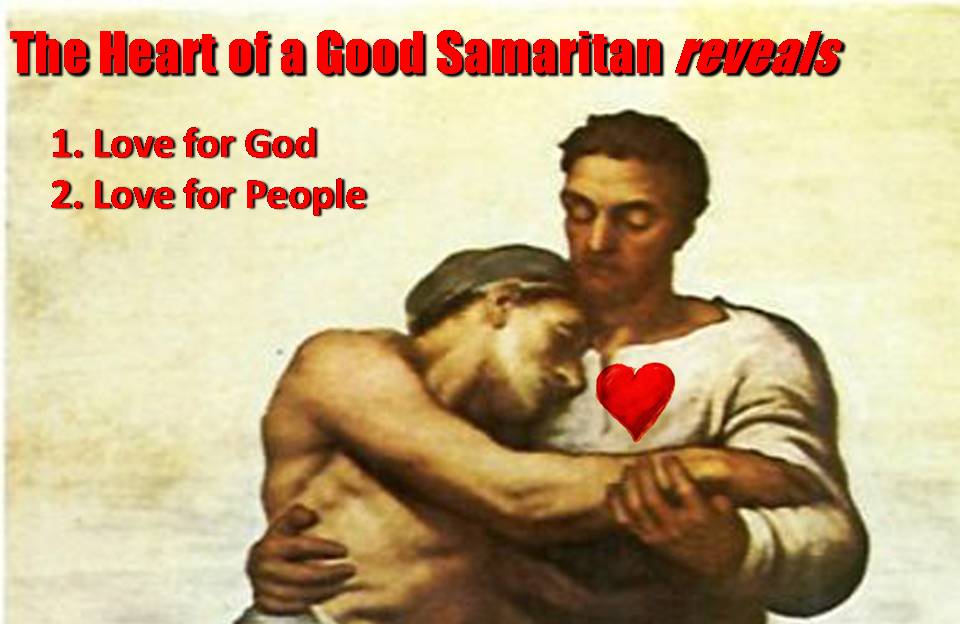
The Parable of the Good Samaritan starts with a lawyer, Greek nomikos, who is a “legal expert, or a jurist, or a lawyer, and a man who is skilled in interpreting the Jewish Torah testing Jesus on a point of law.” The Jews often called upon a lawyer or jurist of the scriptures to settle legal issues. The purpose of using this question to test Jesus was not intended to reaffirm the lawyer’s faith in Christ, but more likely an attempt to find a flaw in His understanding of the scriptures. Jesus was quite astute by turning the question back to the lawyer and giving him the test, instead. Another interesting aspect of Jesus response was to allow the lawyer to answer his own question and to follow it up by advising the lawyer to show love of God and love to others, indicating that the attempt to trap Jesus implied motives absent of love for either, but more of an earthly desire based on distrust or fear.
The priest and Levite in the parable represent the religious elite. These people were characteristically arrogant and hypocritical, treating others they considered to be of a lower class, such as Samaritans, with contempt. Samaritans, in particular, were looked down upon. For though holding claims on Judaism, they were not pure Jews. They were half-breeds both genetically and theologically, a mixture between the Jews of captivity and the Samaritan people of the land they were captive in. Jews typically held Samaritans in contempt. The Samaritans were not gentiles and were still bound to the same law as the Jews. The parable illustrates the Jesus’ characteristic trait to humiliate the proud and lift up the humble, and thus he used a Samaritan in his illustration.
Jerusalem and Jericho are connected by a 27 Kilometer road. This road is quite steep, dropping over 4800 KM in altitude. In the times of Jesus, this road was notorious for robbers and thieves. The prospect of traveling this route and encountering a victim as described in the parable is quite within reason.
While the reaction of the priest and Levite could be rationalized that both avoided the half-dead man on the road because they feared the man to be not a victim but bait for a trap set by thieves. The fact that neither returned with help really shows the how self-absorbed these two were. The other rationalization for their reaction might be the fear that the victim was already dead and touching a dead body, if not a Jew, would defile particularly the priest to the point that he would not be able to collect, distribute or consume sacrifices presented to priests as tithes. Levites were descendants of Levi, but not of Aaron. Levites assisted priests, who were descended of Aaron, in the temple. The same expectation of non-defilement would apply. Whatever the reason for the journey of the priest and the Levite, each felt their business more important than the life a wretched victim found half-dead on the road, without help left to die.
So if the priest and Levite had decided to not stop to help this man, we would not be surprised if Samaritan had decided to do the same. Instead, we see in Luke 10:33 that the Samaritan shows compassion and acts on his compassion by stopping and treating his wound, then taking the man to an inn on his own animal, and paid in advance for the man’s room and board; promising to return and pay for any more spent for the care of the man.
Another example of a modern day Samaritan left to die by individuals with “more important” priorities is found among the elite mountain climbing community and their treatment of climber Lincoln Hall, who was rescued by Dan Mazur and Mazur’s team of fellow climbers, as described in summitclimb.com.

Dan Mazur is most widely known for his discovery and assistance in the rescue of Lincoln Hall, an Australian climber on Mount Everest on 25 May 2006. Lincoln Hall had been ‘left for dead’ by another expedition team the previous day at around 8700m on Everest after collapsing and failing to respond to treatment on the descent from the summit. Mazur and his fellow climbers – Andrew Brash (Canada), Myles Osborne (UK) and Jangbu Sherpa (Nepal) – in abandoning their own attempt on the summit in order to save Hall’s life epitomised the noblest traditions of mountaineering. Their sacrifice was underscored by the death of a British climber; David Sharp, who died a few days before Hall, lower down on the same route. Approximately 40 people said they saw Mr. Sharp in distress, and walked past him, but no one rescued David Sharp, and he subsequently died. Sir Edmund Hillary, who made the first ascent of Everest in 1953 with Tenzing Norgay Sherpa, spoke out against those 40 people, and said that nothing like that would have happened in his day.
http://www.summitclimb.com/new/default.asp?chyes=y&mtype=&prid=519&vid=520

What was Mazur’s opinion of his team’s actions in contrast to the inactions of other climbing teams with respect to helping a climber left to die on the route to the peak of Mount Everest? The website uwpexponent.com provides us with Mazur’s view on the subject:
In May 2006, Mazur made headlines when, while leading a small group of climbers on Everest, he discovered an injured climber named Lincoln Hall. Hall had been left for dead by his own climbing group a day prior. Mazur and his group risked their lives to save Hall’s.
“When the story became international news, I was really surprised,” Mazur said. “I didn’t do anything different on that climb than I normally would have in that type of situation.”
During the rescue, Mazur attempted to flag down two passers-by for help. The climbers claimed they did not speak English and continued on their journey to the top. Mazur later discovered that they did in fact speak English. Mazur explained that the urge to reach the top often effects the decision making of mountain climbers.
“They said they didn’t stop because they were working on a research project and didn’t have the time to,” Mazur said. “I then asked them in a non-confrontational way what they thought about people who climb to the top and can’t make it down on their own.”
Mazur further explained that the two hinted that if people are not strong enough to get back down on their own, they essentially deserve to die at the top.
“Every one of us has the ability to stop and help someone out, every last one of us,” said Mazur. “However, every last one of us also has the ability not to stop.”
http://uwpexponent.com/features/2013/03/21/mazur-speaks-about-everest-climb-rescue/
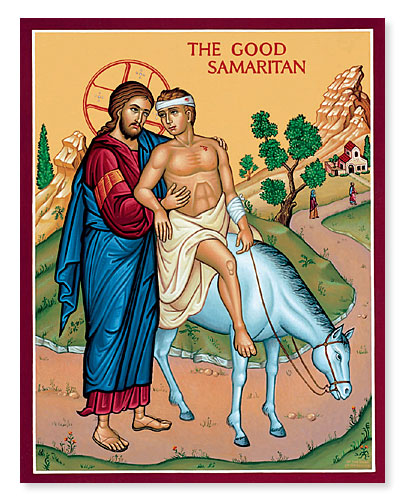
According to John Welch’s Commentary, this parable is an allegory of the Fall and the Redemption of Mankind:
“This parable’s content is clearly practical and dramatic in its obvious meaning, but a time-honored Christian tradition also saw the parable as an impressive allegory of the Fall and Redemption of mankind.
“This allegorical reading was taught not only by ancient followers of Jesus, but it was virtually universal throughout early Christianity.”
In this allegorical interpretation of the parable, perhaps Jesus was hinting in this parable of the fact that he was going to pay the price for our salvation.
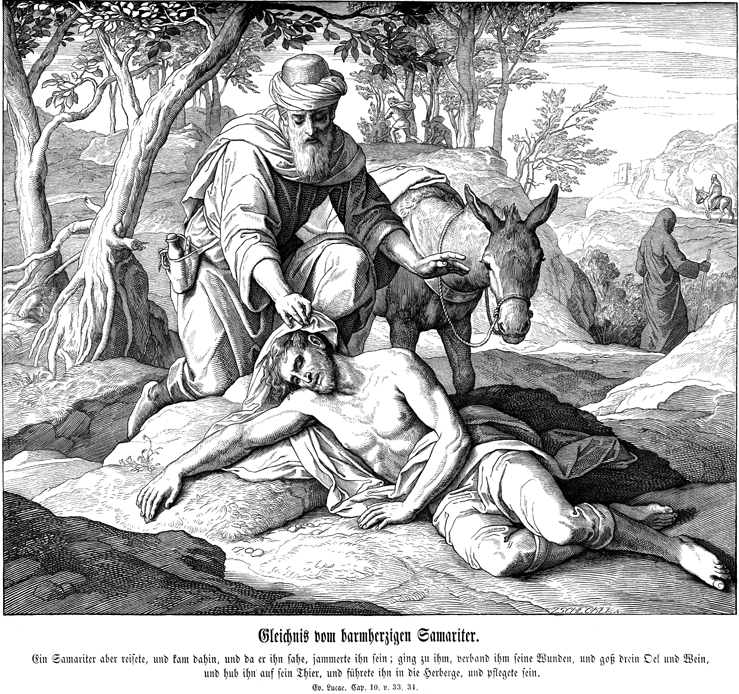
I would like to offer another interpretation of the parable; that this parable is an allegory, but with a different paradigm or point of view from the traditional. With all due respect to John Welch and others, I would like to offer a different allegory, wherein Christ is represented not by the Samaritan, but instead, Christ is the fallen victim, avoided by the quote “Corporate Religious Groups”, or modern-day Pharisees whose focus is upon achieving their self-serving goals. They would find nothing worthwhile to the corporate group’s interests in helping a half-dead wretch on the road or any other poor individual unable to contribute financially to their organization’s bottom line or financial growth. Such groups would deem it not only advantageous to themselves to not stop and help; better to give misery a wide berth, as stopping would only impede its self-serving financial objectives.
It is surprising that I have been asked on occasion by people associated with Christian Groups: “Why do we at BLCF Church bother wasting resources and time hosting the BLCF Café Community Dinner in the heart of Toronto for the homeless and marginalized? After all, what could they contribute financially to our church in return?”
My response is: “Really! I mean really!”
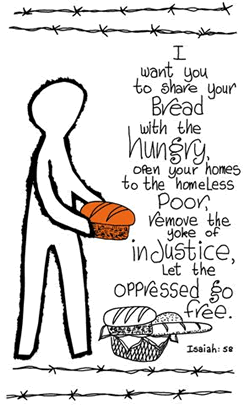
Members of such large misguided religious corporations are represented in the parable by the Priest and Levite. They find that the dying individual does not fit into their corporate schedule. Besides, they are already late for some important meeting, and anyway, it’s contrary to their business plan to assume the liability or risk of helping a relatively insignificant individual. After all, it’s all about numbers and corporate sponsorship.
In the parable, it appears for the Priest and the Levite and the Levite, their focus was more upon themselves, their position in the church, and the fact that there was nothing to be personally gained, by stopping to help this man; a viewpoint which flies in the face of the Lord’s expectation of the practice of believers, as we see in Proverbs 14:31. Now, it is popular among some Christian circles to portray Jesus as a radical with a totally different view from the Scriptures, which we refer today as the Books of the Old Testament. But what Jesus taught in Matthew 20 about helping the least of our brothers and sisters was totally in sync with the Old Testament. It was Pharisees, Scribes and other Jewish leaders who twisted the interpretation of the Scriptures to suit their own worldly priorities instead of the Lord’s, not unlike some so-called Christian churches today. Fortunately there those who hold close to the Lord’s intended purpose in the Scriptures. Just below the graphic illustration of the Lord’s Commandments in Luke 10, we find the verse from Proverbs 14.

Proverbs 14:31 (ESV)
31 Whoever oppresses a poor man insults his Maker,
but he who is generous to the needy honors Him.
By their motivations and actions in not showing compassion and help the least of these, they have brought upon themselves the same treatment for their souls, condemning death upon them, by putting their own interests first. The same could be said for individuals and organizations that focus on their own growth and make no provision for caring for those in need who cannot contribute to their bottom line. The Apostle Paul authored numerous letters to Christian churches whose membership had drifted away from the path given to them by the Lord’s gospel and word.
Now think back on the Good Samaritan Parable, where the traditional interpretation holds that the Samaritan in the parable represents Jesus. My belief that the penniless, naked, beaten, half-dead man on the road to Jericho is not the fallen Adam, but Jesus who was beaten, naked, abandoned, left to die. And how did I come to such a different conclusion? The answer is from Jesus own words, as we read in Matthew 25:31-40, where Christ tells us exactly who the beaten (sick), the naked stranger on the road is:

Matthew 25:31-40 The Final Judgment
31 “When the Son of Man comes in his glory, and all the angels with him, then he will sit on his glorious throne. 32 Before him will be gathered all the nations, and he will separate people one from another as a shepherd separates the sheep from the goats. 33 And he will place the sheep on his right, but the goats on the left. 34 Then the King will say to those on his right, ‘Come, you who are blessed by my Father, inherit the kingdom prepared for you from the foundation of the world. 35 For I was hungry and you gave me food, I was thirsty and you gave me drink, I was a stranger and you welcomed me, 36 I was naked and you clothed me, I was sick and you visited me, I was in prison and you came to me.’ 37 Then the righteous will answer him, saying, ‘Lord, when did we see you hungry and feed you, or thirsty and give you drink? 38 And when did we see you a stranger and welcome you, or naked and clothe you? 39 And when did we see you sick or in prison and visit you?’ 40 And the King will answer them, ‘Truly, I say to you, as you did it to one of the least of these my brothers and sisters, you did it to me.’

So if we walk by a beaten, naked, half-dead, penniless man left to die on the road, for whatever excuse we choose to rationalize our behavior, we have violated the rule stated in Luke 10:27b: “love… your neighbor as yourself.” And since God states that how to treat or mistreat others, particularly the less-fortunate shows to God how we love him, Luke 10:27a.
“You shall love the Lord your God with all your heart and with all your soul and with all your strength and with all your mind”

By violating these two rules, that is, by not demonstrating love to our neighbor who is in need, God says you are treating Him the same way and you condemn your soul to death.
But the keyword in Luke 10, is love, which the Apostle Paul describes for us as the “The Way of Love”, in 1 Corinthians 13.
1 Corinthians 13 (ESV) The Way of Love
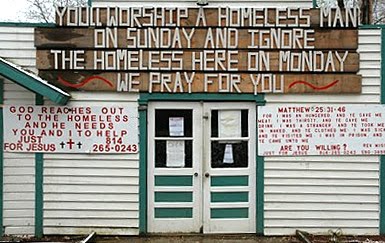
13 If I speak in the tongues of men and of angels, but have not love, I am a noisy gong or a clanging cymbal. 2 And if I have prophetic powers, and understand all mysteries and all knowledge, and if I have all faith, so as to remove mountains, but have not love, I am nothing. 3 If I give away all I have, and if I deliver up my body to be burned,[a] but have not love, I gain nothing.
4 Love is patient and kind; love does not envy or boast; it is not arrogant 5 or rude. It does not insist on its own way; it is not irritable or resentful;[b] 6 it does not rejoice at wrongdoing, but rejoices with the truth. 7 Love bears all things, believes all things, hopes all things, endures all things.
8 Love never ends. As for prophecies, they will pass away; as for tongues, they will cease; as for knowledge, it will pass away. 9 For we know in part and we prophesy in part, 10 but when the perfect comes, the partial will pass away. 11 When I was a child, I spoke like a child, I thought like a child, I reasoned like a child. When I became a man, I gave up childish ways. 12 For now we see in a mirror dimly, but then face to face. Now I know in part; then I shall know fully, even as I have been fully known.
13 So now faith, hope, and love abide, these three; but the greatest of these is love.
Footnotes: a. 1 Corinthians 13:3 Some manuscripts deliver up my body [to death] that I may boast b. 1 Corinthians 13:5 Greek irritable and does not count up wrongdoing

In conclusion, the next time you see an opportunity to help others and choose to walk around or go the other way, from someone in need, you have brought upon yourselves a heavy judgment by Son of Man on the Day of Judgment. You have in all likelihood denied yourself a place in God’s Kingdom.
As believers in the resurrected Christ, we are considered to be “Born again” in God’s Holy Spirit, and if given an opportunity to be a “Good Samaritan” to demonstrate love and compassion to someone who is distress, we would do so without hesitation. Otherwise, as we read in Mathew 25:31-40, we can expect to be judged, accordingly.
Let us pray…
Closing Hymn #546: Sing the Wondrous Love of Jesus
Benediction – (Ephesians 6:23-24):
Peace be to the brothers and sisters, and love with faith, from God the Father and the Lord Jesus Christ. Grace be with all who love our Lord Jesus Christ with love incorruptible.































